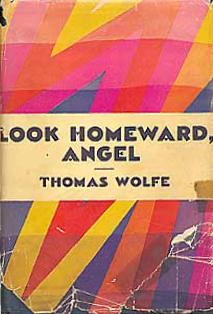Look Homeward, Angel
by Thomas Wolfe
Review By Dan Geddes
10 January 2000
Thomas Wolfe shows his readers the magic in everyday life. Look Homeward, Angel is the story of an early twentieth century North Carolina family as told through the eyes of the youngest son, Eugene Gant. The Gants, despite delightful eccentricities stemming from both sides of the family, are not extraordinary. But through the eyes of Thomas Wolfe, their lives sparkle with joy and tragedy.
Look Homeward, Angel is a book of a life, a plotless book that we read because of Wolfe’s poetic genius. Wolfe is primarily a describer: of individuals, landscapes, human behavior. His work is an inexhaustible mine of inventive description, much of which has surely been purloined by later writers. He tirelessly describes each character, making each come alive, however fleetingly, like transient acquaintances from our own lives. The town of Altamont becomes fondly familiar to us, but Wolfe can always show us a new corner of it.
Other novelists, having established a character in the reader’s eye, often forego further description in the interest of plot or brevity. Wolfe works doggedly to keep his scenes alive with distinctive dialogue and mannerisms. Wolfe invites us into his world. We are given, besides great fiction, a valuable social document of life in Asheville, North Carolina in the early years of the twentieth century.
As poeticized prose the book is a joy to read, rich with imagination on every page.
However, a problem with such a work is that, having read it, it seems as awash in little experiences as life itself. Because the level of the narrative is intimate, often pausing to paint scenery or interpret characters and their gestures, there are few truly astonishing scenes. Everything is beautiful; the piece is so consistently good stylistically that we do not stand staggered by the isolated moments, showing the limits of experience, conflict, or the usual narrative elements. Wolfe has no agenda; we are threaded by autobiography. The fact that Wolfe has no agenda may help explain his relative obscurity today, in the age of political literature.
Gant almost better qualifies as a compelling figure, as a father would in a son’s eyes. But again, outside of his enjoyable rhetoric, and his bouts of drunkenness, what does he do?
Sometimes characters are rendered through a stock set of gestures that are repeated whenever they appear. Thus: Eliza’s pursed lips, Ben’s repeated and very limited dialogue (“Oh My God”), Helen is somewhat reduced to the role of Caretaker, and has little other depth.
But I do believe there are some limitations to Wolfe’s characterizations. Although even the most transient characters come alive, the main characters do not assume great depth. We can see them: Gant, Eliza, Helen, Ben, Luke, Eugene; but they are all characters in a supporting cast with no lead. Eugene, despite his Stephen Dedelus like fantasies of greatness of genius, is not particularly fascinating. He is intelligent, bookish, imaginative, but lacks the kind of fire, the typical rash rebelliousness we expect of his kind. He, in many ways, is almost a cipher, or rather a lense for what surrounds him, which he can make fascinating through his imagination. But despite the magic glasses of his imaginative powers, Eugene is always simply reading or imagining. His sexual forays are timid and usually lacking. And his delusions of grandeur toward the end, however charmingly self-deprecating, do not qualify him for status as an actor. As Fitzgerald said: “Action is character,” and Eugene, as an adolescent, is not capable of doing much of anything. He shows signs of starting to do things, but perhaps he becomes a character in his sequel, Of Time And The River.

